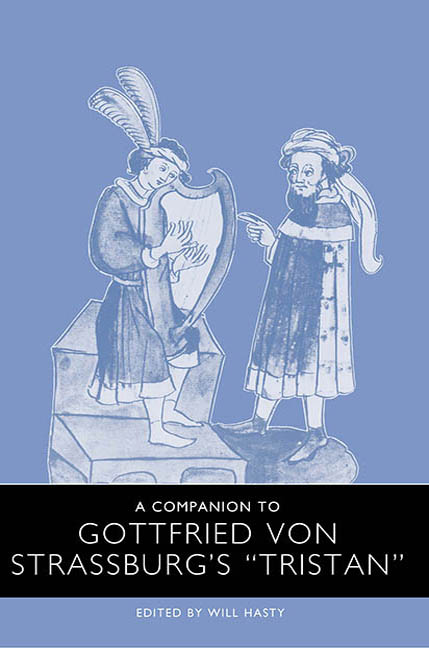Book contents
- Frontmatter
- Contents
- Acknowledgments
- Introduction: The Challenge of Gottfried's Tristan
- I Cultural and Social Contexts
- Humanism in the High Middle Ages: The Case of Gottfried's Tristan
- Gottfried's Strasbourg: The City and Its People
- II Figures, Themes, Episodes
- III Gottfried's Narrative Art
- IV The Medieval and Modern Reception of Gottfried's Tristan
- Notes on the Contributors
- Index
Humanism in the High Middle Ages: The Case of Gottfried's Tristan
from I - Cultural and Social Contexts
Published online by Cambridge University Press: 28 April 2017
- Frontmatter
- Contents
- Acknowledgments
- Introduction: The Challenge of Gottfried's Tristan
- I Cultural and Social Contexts
- Humanism in the High Middle Ages: The Case of Gottfried's Tristan
- Gottfried's Strasbourg: The City and Its People
- II Figures, Themes, Episodes
- III Gottfried's Narrative Art
- IV The Medieval and Modern Reception of Gottfried's Tristan
- Notes on the Contributors
- Index
Summary
Humanism as a modern concept, first used around the middle of the nineteenth century to designate a historical period, is integrally connected to the literature of antiquity. In the works of the Greeks and Romans, it was thought, the studia humanitatis (Cicero) had reached such a degree of accomplishment that they could provide a model for all human education. Beyond the purely literary aspect, humanism as an intellectual movement also involved an emancipatory potential. The humanism emanating from Italy in the early modern period was seen to mark the end of the Middle Ages and the beginning of a new epoch. In the meantime developments in historical research have suggested that humanism made a much earlier appearance. The critical discussion of humanism, which has increasingly shown itself to be a very complex historical phenomenon, was stimulated especially by Charles Haskins's book The Renaissance of the 12th Century, but this discussion continues to the present day to be largely shaped by Jakob Burckhardt's problematical conception of the Renaissance, and Gilson's contribution on medieval humanism in 1926 could do very little to change the traditional view of humanism as a post-medieval development (see Gilson 171–96, Leclercq 69–113, and Southern 29–135).
In the secularized thinking of today, people find their reason for being within themselves and consider the development of one's inner potential as the goal of humanity. Neither Greco-Roman antiquity nor Christianity is necessary for self-realization. The Middle Ages of course had a different conception of humanity, according to which man had been created ad imaginem Dei. To be sure, this imago had been corrupted by original sin, but it had not been completely destroyed. It was in the Creator, rather than in themselves, that medieval people found their reason for being, but with its basic idea of the Incarnation of the divine, Christianity did include the possibility of a grand view of humanity and the world, even if this possibility was not generally realized in a humanism in the proper sense of the word.
- Type
- Chapter
- Information
- A Companion to Gottfried von Strassburg's Tristan , pp. 23 - 54Publisher: Boydell & BrewerPrint publication year: 2003



